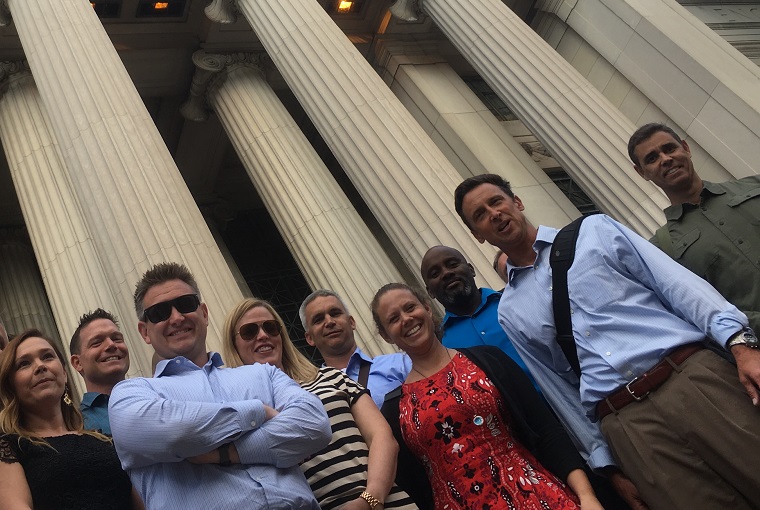Naval War College students explore disaster response solutions at MIT’s Urban Risk Lab

CAMBRIDGE, Mass. – Just days before Hurricane Irma made landfall in the United States, U.S. Naval War College (NWC), Newport, Rhode Island students were at the Massachusetts Institute of Technology (MIT), Cambridge, Massachusetts meeting with the designers of RiskMap, a new crowdsourced platform launched domestically in Broward County, Florida to track and map flooding.
RiskMap was just one of many technologies students explored at MIT, all carefully designed with a mission to “innovate on techniques, processes, and systems to address the complexities of seismic, climatic, and hydrologic risks.”
The presentation was an opportunity for students enrolled in NWC’s Innovations in Technology for Humanitarian Response elective to join Cambridge’s top designers and researchers to learn about leading-edge tools for civilian humanitarian response and hazard mitigation.
“Providing opportunities for civil-military engagement in the classroom allows for meaningful exchange of knowledge between researchers and military actors,” said Lily Bui, a doctoral candidate at MIT who helped to organize the event. “These interactions allow researchers to find different audiences, applications, and feedback for their work. At the same time, students in the military confer value to the research by corroborating it with their own experiences and operational perspectives.”
“The military has a tendency to focus on our organic assets and capabilities,” said Cmdr. Meghan Angermann, a NWC student who took part in the conference. “It was eye-opening and inspiring to learn about the innovations in technology and research that reside within other sectors. This is a continual reminder that a joint approach is usually the most effective.”
While the MIT Urban Risk Lab focuses on scalable solutions to global issues of disaster preparedness, risk reduction and resilience of communities, the students who attended the event were able to focus on domestic applications in Texas after Hurricane Harvey and potential international applications with the immediate threat of Hurricane Irma.
“It was a rare and important opportunity to apply what we study in a context we all intimately understand,” said Dave Polatty, associate director in NWC’s College of Operational and Strategic Leadership and director of NWC’s Humanitarian Response Program. “You can learn a great deal about global trends and research methods from these experts, but when you apply it to your own community, you have a whole different level of engagement.”
This type of collaboration between civilian and military is becoming increasingly common among academics and practitioners involved in humanitarian activities.
“The staff at the Urban Risk Lab provided our students with an exceptional overview of their work and its immediate relevance,” said Polatty. “International militaries will increasingly find themselves responding to humanitarian emergencies in complex urban settings, so establishing a shared understanding of different approaches and capabilities today will undoubtedly lead to more effective responses in the future.”
NWC is a one-year resident program that graduates about 600 resident students and about 1,000 distance learning students each year. Its primary mission is to educate and develop future leaders. Additional missions include: helping to define the future Navy and its roles and missions, supporting combat readiness, strengthening global maritime partnerships, promoting ethics and leadership throughout the force, contributing knowledge to shape effective decisions through our John B. Hattendorf Center for Maritime Historical Research, providing expertise and advice to the international legal community through the Stockton Center for the Study of International Law. Students earn Joint Professional Military Education (JPME) credit and either a diploma or a master’s degree in National Security and Strategic Studies or Defense and Strategic Studies. Established in 1884, U.S. Naval War College is the oldest institution of its kind in the world. More than 50,000 students have graduated since its first class of nine students in 1885 and about 300 of today’s active duty admirals, generals and senior executive service leaders are alumni.
